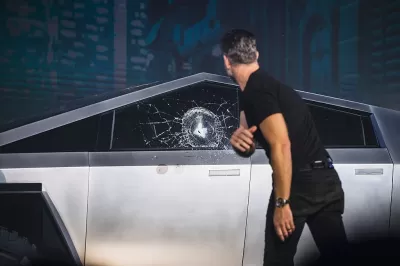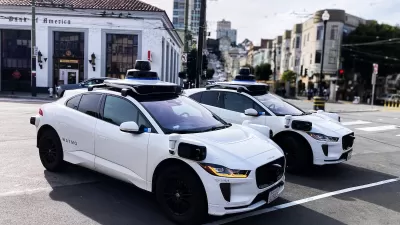Musk has leveraged social media intrigue and a hot streak on the market to become the standard bearer for autonomous vehicle technology. Trust Tesla at public peril, argues James Brasuell in this opinion piece.

Perhaps lost in the recent whirlwind of salacious news about secret children and Twitter around Tesla CEO Elon Musk is a damning report that reveals the depths of Musk’s loose relationship with facts.
According to an article by Russ Mitchell for the Los Angeles Times, Musk has been caught in a lie on Twitter (of course)—this time, the lies erase lives.
In January, Santa Monica investment manager and vocal Tesla booster Ross Gerber tweeted that “There has not been one accident or injury since FSD beta launch. Not one. Not a single one.”
Elon Musk’s one-word response to that tweet: “Correct.”
As explained by Mitchell, Tesla in 2021 expanded a “beta” program for self-driving technology from a few thousand people to a numbers that now exceed 100,000 vehicles.
“The $12,000 feature purportedly lets a Tesla drive itself on highways and neighborhood streets, changing lanes, making turns and obeying traffic signs and signals,” explains Mitchell. The feature is called “Full Self-Driving,” despite ongoing questions about how much the feature can be trusted to do what it promises and whether Musk and Tesla are deliberate misleading their customers about the capabilities of the technology.
Publicly available data from the National Highway Traffic Safety Administration offers more of the proof skeptics were seeking. At the time of the Tweet, “dozens of drivers had already filed safety complaints with the National Highway Traffic Safety Administration over incidents involving Full Self-Driving,” according to Mitchell, “at least eight of them involved crashes.” A full tally of the safety data, published in June, reveals 273 crashes.
Tesla is planning to increase the number of vehicles with “Full Self Driving” tech from 100,000 to 1 million in a few months, after significant delays caused by, you know, the difficulty of actually building a self-driving car that works.
For better or worse, Elon Musk and Tesla are the standard bearers for the electric vehicle industry. Elon Musk is walking around as the richest man in the world, based in part on the hot run of Tesla stock and in part by a Trumpian ability to capture the attention of the public with the use of Twitter. In Musk’s brand of weird social media genius, he even threatened to buy Twitter—a move Trump is probably not rich enough to dream of making. Needless to say, the stage had been set by preceding charlatans for Musk drama to continue to play out with legal and public attention. Tesla’s public perception will continue to benefit by this attention, somehow.
The latest revelations should cast doubt on the entire automated vehicle industrial complex, however. Musk has publicly lied about the safety and reliability of Tesla vehicles, again. Policy makers and the public act like autonomous vehicle tech is a foregone conclusion when it’s nowhere near a done deal—the recent departure of Musk’s own employees would seem to enforce some healthy skepticism for what’s about to happen with Tesla’s big push for “Full Self Driving” tech.
Planners must be the first in line to stop treating everything this man says as gospel truth. Self-driving cars aren’t the only angle that planners have yet to cast sufficient doubt on Musk’s promises—there’s also the whole Boring Co. pitch, which officials from Las Vegas to Chicago to Los Angeles to Baltimore and D.C. to Miami to the Inland Empire bought to varying degrees. Musk’s fingerprints are all over the Hyperloop idea, which is falling apart even as entire regions spend big money to study the idea.
Even setting aside Tesla for a moment to consider the self-driving industry as a whole, there’s more and more evidence all the time that self-driving cars won’t save us from the excesses of automobile dependency—in fact, they will only exacerbate congestion and pollution. A study published by the Transportation Research Part D: Transport and Environment journal last week predicts that autonomous vehicles will increase Vehicle Miles Traveled and emissions by ten percent in Southern California by inducing new travel demand. The study also predicts automated vehicles will worsen transportation equity.
Musk as the savior of society is far too convenient a narrative to suffice as a solution for the great challenges of our era. Unfortunately, it needs to be said again: It’s time to set aside Musk’s BS and focus on solutions we know will work: reducing the negative externalities of driving by reducing vehicle miles traveled—not substituting one engine for another or replacing drivers with a computer.
It is time to end this era of uncritical exuberance, led by Elon Musk and his fanboys—both online and in City Hall. Planners know better. It’s time to speak up and say Musk and Tesla and the Boring Co. are exactly what we don’t need.

Alabama: Trump Terminates Settlements for Black Communities Harmed By Raw Sewage
Trump deemed the landmark civil rights agreement “illegal DEI and environmental justice policy.”

Study: Maui’s Plan to Convert Vacation Rentals to Long-Term Housing Could Cause Nearly $1 Billion Economic Loss
The plan would reduce visitor accommodation by 25% resulting in 1,900 jobs lost.

Planetizen Federal Action Tracker
A weekly monitor of how Trump’s orders and actions are impacting planners and planning in America.

Wind Energy on the Rise Despite Federal Policy Reversal
The Trump administration is revoking federal support for renewable energy, but demand for new projects continues unabated.

Passengers Flock to Caltrain After Electrification
The new electric trains are running faster and more reliably, leading to strong ridership growth on the Bay Area rail system.

Texas Churches Rally Behind ‘Yes in God’s Back Yard’ Legislation
Religious leaders want the state to reduce zoning regulations to streamline leasing church-owned land to housing developers.
Urban Design for Planners 1: Software Tools
This six-course series explores essential urban design concepts using open source software and equips planners with the tools they need to participate fully in the urban design process.
Planning for Universal Design
Learn the tools for implementing Universal Design in planning regulations.
Caltrans
Smith Gee Studio
Institute for Housing and Urban Development Studies (IHS)
City of Grandview
Harvard GSD Executive Education
Toledo-Lucas County Plan Commissions
Salt Lake City
NYU Wagner Graduate School of Public Service





























